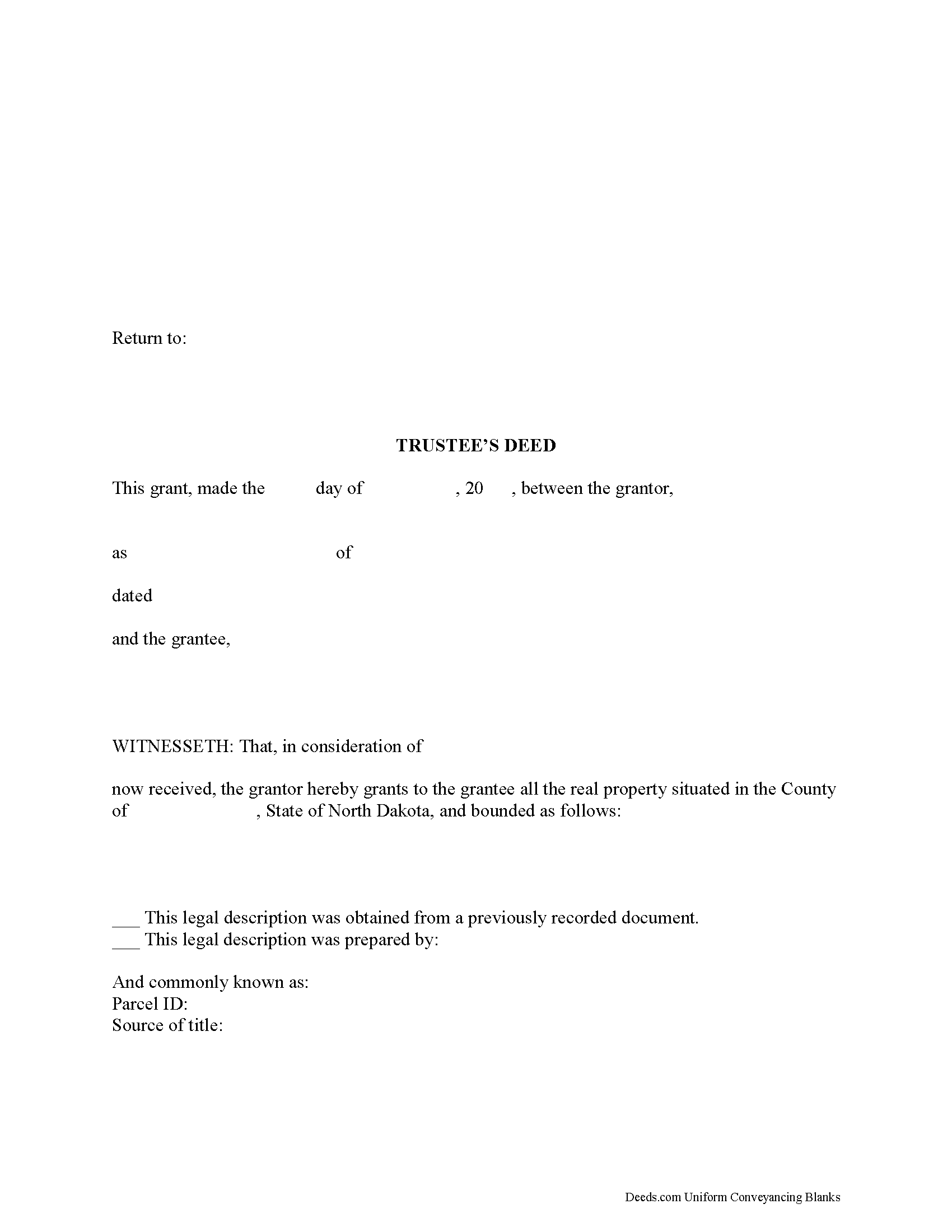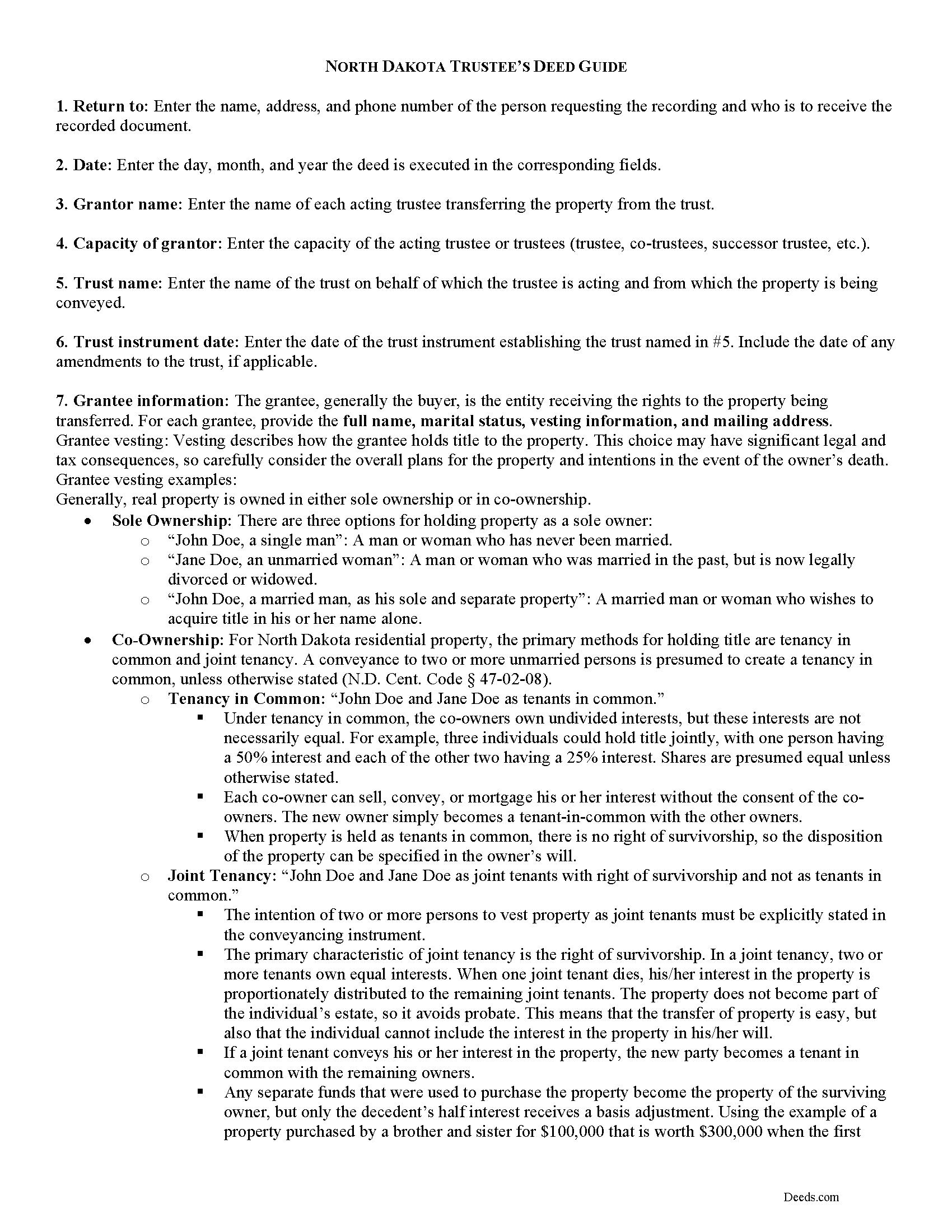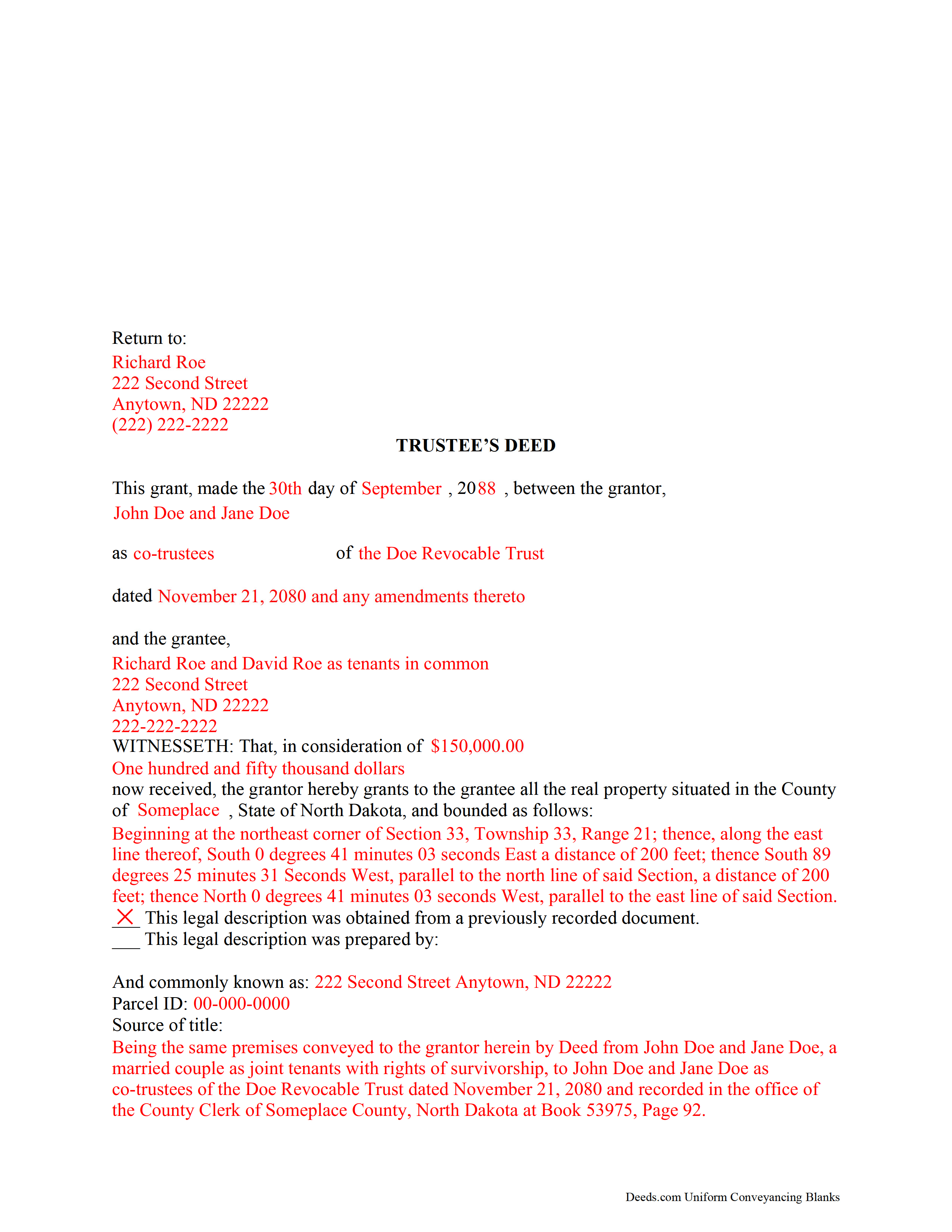Mckenzie County Trustee Deed Form

Mckenzie County Trustee Deed Form
Fill in the blank form formatted to comply with all recording and content requirements.

Mckenzie County Trustee Deed Guide
Line by line guide explaining every blank on the form.

Mckenzie County Completed Example of the Trustee Deed Document
Example of a properly completed form for reference.
All 3 documents above included • One-time purchase • No recurring fees
Immediate Download • Secure Checkout
Additional North Dakota and Mckenzie County documents included at no extra charge:
Where to Record Your Documents
McKenzie County Recorder
Watford City, North Dakota 58854
Hours: 8:00 AM - 4:30 PM CT
Phone: (701) 444-3616 Ext 4
Recording Tips for Mckenzie County:
- Bring your driver's license or state-issued photo ID
- Double-check legal descriptions match your existing deed
- Documents must be on 8.5 x 11 inch white paper
- Ask about their eRecording option for future transactions
- Check margin requirements - usually 1-2 inches at top
Cities and Jurisdictions in Mckenzie County
Properties in any of these areas use Mckenzie County forms:
- Alexander
- Arnegard
- Cartwright
- Grassy Butte
- Keene
- Mandaree
- Watford City
Hours, fees, requirements, and more for Mckenzie County
How do I get my forms?
Forms are available for immediate download after payment. The Mckenzie County forms will be in your account ready to download to your computer. An account is created for you during checkout if you don't have one. Forms are NOT emailed.
Are these forms guaranteed to be recordable in Mckenzie County?
Yes. Our form blanks are guaranteed to meet or exceed all formatting requirements set forth by Mckenzie County including margin requirements, content requirements, font and font size requirements.
Can I reuse these forms?
Yes. You can reuse the forms for your personal use. For example, if you have multiple properties in Mckenzie County you only need to order once.
What do I need to use these forms?
The forms are PDFs that you fill out on your computer. You'll need Adobe Reader (free software that most computers already have). You do NOT enter your property information online - you download the blank forms and complete them privately on your own computer.
Are there any recurring fees?
No. This is a one-time purchase. Nothing to cancel, no memberships, no recurring fees.
How much does it cost to record in Mckenzie County?
Recording fees in Mckenzie County vary. Contact the recorder's office at (701) 444-3616 Ext 4 for current fees.
Questions answered? Let's get started!
Transferring Real Property from a Trust in North Dakota
A trust is an arrangement whereby a person (the grantor or settlor) transfers property to another (the trustee) for the benefit of a third (the beneficiary). In general, trusts in North Dakota are governed by Chapters 59-09 through 59-19 of the North Dakota Century Code as the North Dakota Uniform Trust Code.
To create a trust, the settlor transfers property to a trustee either during his lifetime (an inter vivos trust) or by will upon his death (a testamentary trust) (N. D. Cent. Code 59-12-01). It must be created for lawful purposes and have a definite beneficiary, or a person with "a present or future beneficial interest in a trust, vested or contingent, including the owner of an interest by assignment or transfer" ( 59-09-05, 59-12-04; 59-09-03(3)(a)).
In North Dakota, trusts relating to real property are invalid without a written instrument signed by the trustee ( 59-12-18). The trust instrument is an unrecorded document executed by the settlor that "contains [the] terms of the trust, including any amendments to the record" ( 59-09-03(25)). In addition to designating the trustee (and successor, if the settlor also serves as the original trustee) and conferring specific powers upon the trustee, the trust instrument establishes the scope of trust's assets and identifies trust beneficiaries.
An inter vivos (living) trust is an alternate method of holding title to real property for estate planning purposes. The settlor transfers real property into the trust by executing a deed titling the property in the name of the trustee as representative of the trust. The trustee administers the trust according to the terms set forth in the trust instrument.
The trustee "is presumed to have the power to sell, convey, and encumber the real property unless restrictions on that power appear in the records of the county recorder" ( 47-140-26). The trustee's authority to convey property is further established by the statutory general power of trustees to exercise "all powers over the trust property which an unmarried owner, who is not an incapacitated person, has over individually owned property of the trustee" and the specific power to sell property, as established by the North Dakota Uniform Trust Code ( 59-16-15, 59-16-16(2)).
In order to convey real property out of the trust, the trustee executes a trustee's deed. The form of conveyance takes its name from the granting party rather than from the type of warranty of title given, as with a warranty deed or special warranty deed, for example.
In North Dakota, the trustee's deed is typically a special warranty deed passing fee simple title, containing the covenants that the grantor has not previously conveyed right, title, or interest to another person and that the property is free from encumbrances made by the grantor or persons claiming under the grantor. These covenants are implied unless explicitly stated otherwise in the form of the conveyance ( 47-10-19).
Because real property held in trust is titled in the name of the trustee on behalf of the trust, in addition to naming each acting trustee, the trustee's deed should reference the trust and date of execution of the instrument establishing the trust. A certificate of trust under 59-18-13 or trustee's affidavit is typically unnecessary, though in some cases is advisable. Consult a lawyer with questions.
Deeds executed by trustees must meet all the same requirements for form and content for documents affecting interests in real property, including a statement of full consideration and legal description of the property being conveyed. All acting trustee signatures, made before a notary public, should be present before the deed is recorded in the office of the recorder of the county in which the subject property is located.
(North Dakota TD Package includes form, guidelines, and completed example)
Important: Your property must be located in Mckenzie County to use these forms. Documents should be recorded at the office below.
This Trustee Deed meets all recording requirements specific to Mckenzie County.
Our Promise
The documents you receive here will meet, or exceed, the Mckenzie County recording requirements for formatting. If there's an issue caused by our formatting, we'll make it right and refund your payment.
Save Time and Money
Get your Mckenzie County Trustee Deed form done right the first time with Deeds.com Uniform Conveyancing Blanks. At Deeds.com, we understand that your time and money are valuable resources, and we don't want you to face a penalty fee or rejection imposed by a county recorder for submitting nonstandard documents. We constantly review and update our forms to meet rapidly changing state and county recording requirements for roughly 3,500 counties and local jurisdictions.
4.8 out of 5 - ( 4574 Reviews )
Matthew L.
September 15th, 2022
I would make just two suggestions. (1) Create and example showing multiple grantor(s) and (2) In the same example, show where and estate is conveyed to two or more people. It would help in knowing the correct format.
Thank you for your feedback. We really appreciate it. Have a great day!
Christine B. B.
May 20th, 2019
The Personal Representatives Deed is definitely a helpful document for my files. I find it need just a little tweaking by deeds.com , There should be more space for the legal description. I did see in the FAQ's you recommend putting it in the Exhibit and this is what I did. Also I couldn't get the year to be accepted and had to write it in. These are just some minor suggestions, on the whole I was grateful to find this document. Thank you.
Thank you for your feedback. Sorry to hear that you had trouble with the date field, we will have it reviewed.
Rebecca M.
December 28th, 2021
This was pretty easy to fill out. The directions on all of the forms was very good. This should make life much easier at the County Recorder. Thank you!
We appreciate your business and value your feedback. Thank you. Have a wonderful day!
Nicole M.
February 24th, 2020
Very helpful and happy with my service. Thanks much!
Thank you!
Samantha S.
April 29th, 2021
I really appreciated Deeds.com. It was quick and easy to use. Saved me substantial time completing my deed recording.
Thank you for your feedback. We really appreciate it. Have a great day!
Jennifer C.
January 8th, 2021
Fast turnaround. Very much appreciated!
Thank you!
Claude F.
February 8th, 2021
quick and easy to use, thank you
Thank you!
John T.
October 12th, 2023
I have not completed the submission of documents yet but the initial sign up and documents were easily done and trouble free. Will update with results soon
Thank you!
james h.
June 15th, 2020
Service was quick and easy to use. I got not only the necessary forms, but instructions and sample forms filled out. Highly recommended.
Thank you!
Nancy C.
July 14th, 2019
Amazing every that you need right at your fingertips. Extremely easy to navigate and very informative. I would highly recommend this site!!!
We appreciate your business and value your feedback. Thank you. Have a wonderful day!
Victor L.
June 2nd, 2021
In a subject that is overbearing, this site made it simple and understandable, all was explained well. Thank you.
Thank you!
Lindsay B.
February 16th, 2019
The form was easy to fill out. The only problem I had was on the Notary page I live in a different state than the property and I couldn't change the name of the state or county where the notary had to sign.
Thanks Lindsay, we appreciate your feedback.
srikanth n.
January 14th, 2020
why not word format??
Good question. There are many reasons, we'll touch on a few. For the end user (you) Adobe Reader is free, Word is not. PDF is the portable document standard, Word is a decent word processor. A portable document format (PDF) maintains document formatting such as margins and font size which is very important to legal documents, Word does not. Have a wonderful day.
David P.
March 26th, 2019
You make the recording/registration process easy to follow - the value to price ratio is awesome!
We appreciate your business and value your feedback. Thank you. Have a wonderful day!
Lori W.
December 2nd, 2020
Great resource! Nice to have these forms and information available. No problems at the recorder, in fact it was the recorder that referred me to deeds.com they like their forms so much.
Thank you for your feedback. We really appreciate it. Have a great day!